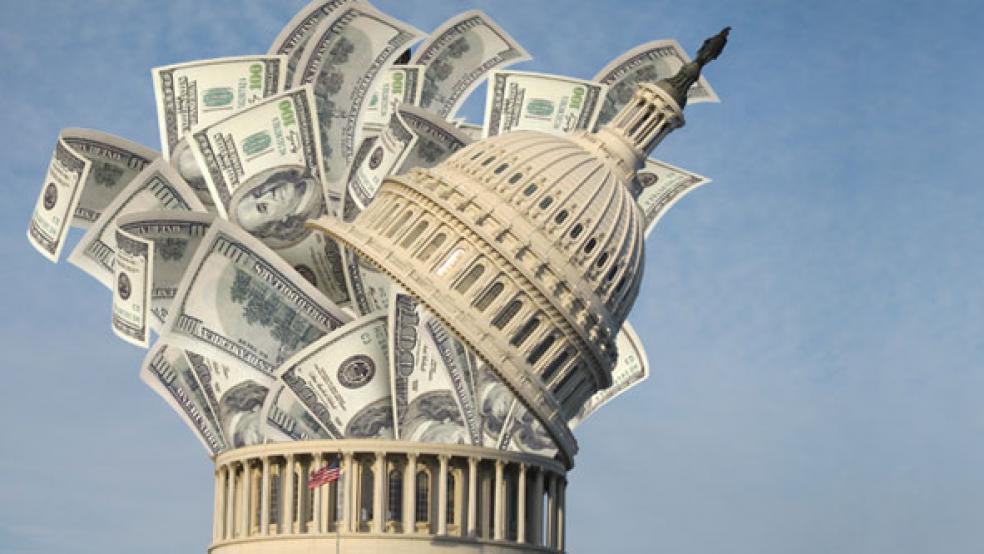The fight over the  debt ceiling is not, of course, a fight about how much government debt we should have. Politicians and the press often make it seem as though the long-run debt is the real issue, but if that were true we’d be hearing a lot more about using tax increases to close the budget gap. After all, our tax burden is not all that high relative to other countries, and there are ways to raise taxes that do not harm economic growth.
debt ceiling is not, of course, a fight about how much government debt we should have. Politicians and the press often make it seem as though the long-run debt is the real issue, but if that were true we’d be hearing a lot more about using tax increases to close the budget gap. After all, our tax burden is not all that high relative to other countries, and there are ways to raise taxes that do not harm economic growth.
In fact, the debt is not even an immediate problem. As the latest estimates from the Congressional Budget Office show, we don’t have a debt problem until over a decade from now, and when the debt does finally begin increasing the main cause will be rising costs for health care. So finding a way to rein in health care costs, something that already seems to be happening, is the key to solving our future debt problem.
RELATED: WHAT EXACTLY IS THE DEBT CEILING?
This political dispute over the debt limit is, plainly and simply, about the size and role of government. In particular, it’s an attempt by Republicans to use undue fear about the debt to scale back or eliminate spending on social insurance programs such as Medicare, Social Security, Obamacare, food stamps, and unemployment compensation. And it’s no accident that this attack on social insurance coincides with growing income inequality.
RELATED: 9 THINGS YOU MUST KNOW ABOUT A GOVERNMENT SHUTDOWN
We have lost something important as a society as inequality has grown over the last several decades, our sense that we are all in this together. Social insurance is a way of sharing the risks that our economic system imposes upon us. As with other types of insurance, e.g. fire insurance, we all put our money into a common pool and the few of us unlucky enough to experience a “fire” – the loss of a job, health problems that wipe out retirement funds, disability, and so on – use the insurance to avoid financial disaster and rebuild as best we can.
RELATED: DEBT CEILING DANGER ZONE THREATENS ECONOMY
But growing inequality has allowed one strata of society to be largely free of these risks while the other is very much exposed to them. As that has happened, as one group in society has had fewer and fewer worries about paying for college education, has first-rate health insurance, ample funds for retirement, and little or no chance of losing a home and ending up on the street if a job suddenly disappears in a recession, support among the politically powerful elite for the risk sharing that makes social insurance work has declined.
Rising inequality and differential exposure to economic risk has caused one group to see themselves as the “makers” in society who provide for the rest and pay most of the bills, and the other group as “takers” who get all the benefits. The upper strata wonders, “Why should we pay for social insurance when we get little or none of the benefits?” and this leads to an attack on these programs.
Even worse, this social stratification leads those at the top to begin imposing a virtue and vice story to justify their desire to stop paying the taxes needed to support social insurance programs. Those at the top did it all by themselves. They “built that” through their own effort and sacrifice with no help from anyone else.
Those at the bottom, on the other hand, are essentially burning down their own houses just to collect the fire insurance, i.e. making poor choices and sponging off of social insurance programs. It’s their behavior that’s the problem, and taking away the incentive to live off of the rest of society by constraining their ability to collect social insurance is the only way to ensure they get jobs and provide for themselves.
Of course, this is a false view of how the system operates. The wealthy would not have the opportunity to make so much money if it society didn’t provide the infrastructure, educated workforce, legal protections, and other building blocks critical for their success. And we shouldn’t forget that many of the wealthy got where they are through the privilege and advantage that comes from familial wealth rather than their own merit.
Contrast that with the fact that the great majority of people receiving payments from social insurance programs are not deadbeats or takers – they are hard working individuals and families who have had a spell of bad luck through no fault of their own e.g. job loss in a recession, and need help getting through it, or who have trouble supporting a household while working at, say, a minimum wage job.
The truth – something those involved in the shameful attempt to make life even harder for the unlucky and the unfortunate seem to have forgotten – is that we are all in this together, and that includes sharing the risks inherent in our economic system through generous social insurance programs.






